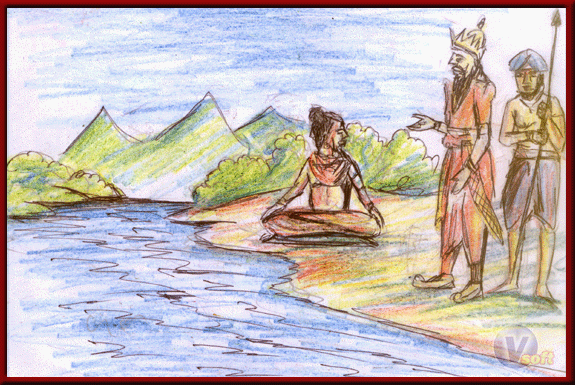234. The Bodhisatta And The Teacher’s Fee

Once upon a time, when Brahmadatta was king of Benares, the country was without gold; for the king oppressed the country and so got treasure. At that time the Bodhisatta was born in a brahmin family of a certain village in Kasi. When he came of age, he went to Takkasila, saying, “I will get money to pay my teacher afterwards, by soliciting alms honourably.” He acquired learning, and when his education was done, he said, “I will use all diligence, my teacher, to bring you the money due for your teaching.” Then taking leave of him, he departed, and traversing the land sought alms. When he had honourably and fairly got a few ounces of gold, he set out to hand them over to his teacher; and on the way went aboard a boat in order to cross the Ganges. As the boat swayed to and fro on the water, the gold fell in.
Then he thought, “This is a country hard to get gold in; if I go seeking again for money to pay my teacher withal, there will be long delay. What if I sit fasting on the bank of the Ganges? The king will by and bye come to learn of my sitting here, and he will send some of his courtiers, but I will have nothing to say to them. Then the king himself will come, and by that means I shall get my teacher’s fee from him.” So he wrapped about him his upper robe and putting outside the sacrificial thread, sat on the bank of the Ganges, like a statue of gold upon the silver sand. The passing crowds, seeing him sit there and take no food, asked him why he sat. But he never said a word for one of them. Next day the villagers of the suburb got wind of his sitting there, and they too came and asked, but he told them no more; the villagers seeing his exhausted condition went away lamenting. On the third day came people from the city, on the fourth came the city grandees, on the fifth those about the king, on the sixth day the king sent his ministers; but to none of them would the man speak.
On the seventh day the king in alarm came to the man, and asked an explanation:
“O plunged in thought on Ganges’ bank, why spoke you not again
In answer to my messages? Will you conceal your pain?”
When this he heard, the Great Being replied, “O great king! The sorrow must be told to him that is able to take it away, and to no other:”
“O fostering lord of Kasi land! If sorrow be your lot,
Tell not that sorrow to a soul if he can help it not.
“But whosoever can relieve one part of it by right,
To him let all his wish declare each sorrow-stricken wight.
The cry of jackals or of birds is understood with ease;
Yea, but the word of men, O King, is darker far than these.
A man may think, This is my friend, my comrade, of my kin:
But friendship goes, and often hate and enmity begin!
He who not being asked and asked again
Out of due season will declare his pain,
Surely displeases those who are his friends,
And they who wish him well lament again.
Knowing fit time for speaking how to find,
Knowing a wise man of a kindred mind,
The wise to such a one his woe declares,
In gentle words with meaning hid behind.
But should he see that nothing can amend
His hardships, and that telling them will tend
To no good issue, let the wise alone
Endure, reserved and shame fast to the end.”
Thus said the Great Being continued to show his search for money to pay the teacher withal:
“O King! Whole kingdoms I have scoured, the cities of each king,
Each town or village, craving alms, my teacher’s fee to bring.
Householder, courtier, man of wealth, brahmin at every door
Seeking, a little gold I gained, an ounce or two, no more.
Now that is lost, O mighty king! And so I grieve full sore.
No power had your messengers to free me from my pain
I weighed them well, O mighty king! So I did not explain.
But thou hast power, O mighty king! To free me from my pain,
For I have weighed your merit well; to you I do explain.”
When the king read his utterance, he replied, “Trouble not, brahmin, for I will give you your teacher’s fee;” and he gave them.
When the Great Being proceeded to pay his teacher’s fee; and the king in like manner abode by his advice, giving alms and doing good, and ruled in righteousness. So did they both finally pass away according to their deeds.


Leave a Reply